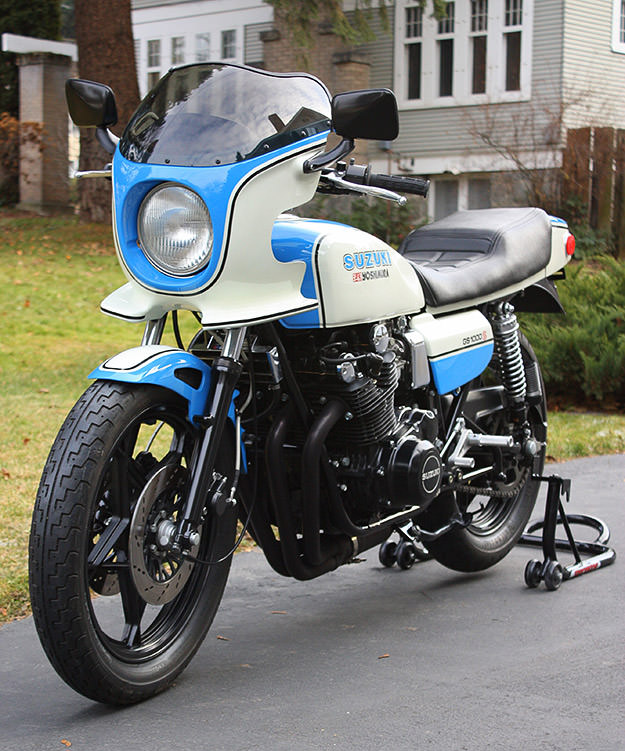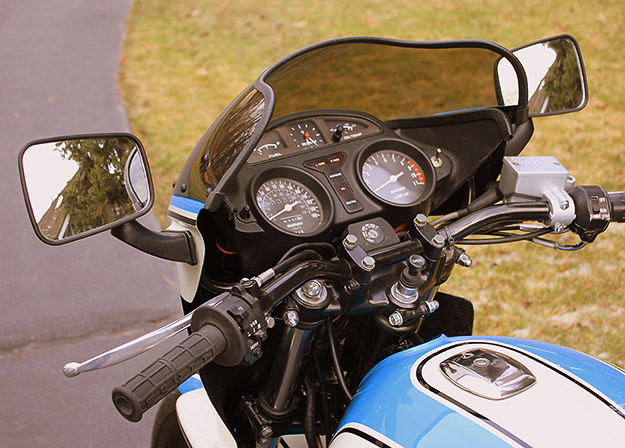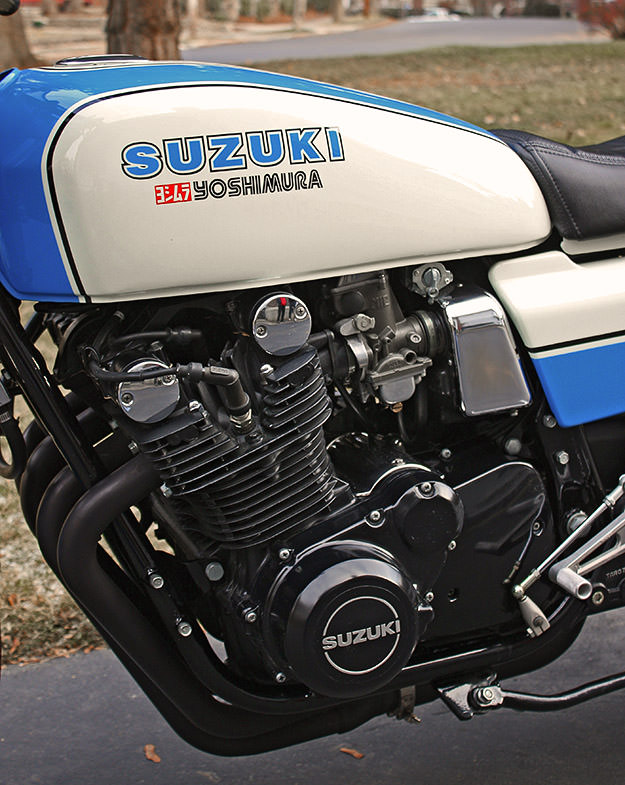
Today’s guest post is by Mitch Boehm, Editor & Publisher of Moto Retro Illustrated. It’s a common thread with us ’70s/’80s superbike guys. We either owned (and sold) or wanted one of the streetbikes we saw sliding around Laguna or Daytona beneath guys like Wes Cooley, Freddie Spencer or Eddie Lawson. Kawasaki KZ1000Rs. Honda CB900Fs. Or Suzuki GS1000Ss. Just looking at the nasty things made our blood boil, but for whatever reason many of us just couldn’t get—or hold onto—them in our youth.
Now, of course, more of us have the money, time and patience to source, restore, maintain and ride these legendary superbikes. And for many fans they provide massive aesthetic and road-going satisfaction.

Larry Pearson is one such enthusiast. After watching Lawson, Spencer and Cooley duke it out in the early ’80s at the AMA Nationals in the Pacific Northwest, Pearson had always harbored major-league lust for a Suzuki GS1000S—a limited-edition open-class superbike available in ’79 and ’80. Pearson finally found an S-model when buddy Devin Corbit bought one and got bogged down on its restoration. “Devin got tired of me whining about buying it,” says Pearson, “and since he needed money for his street rod project, he sold it to me.”
Pearson had always wanted to set up a 1000S with the Right Stuff—the stuff Cooley and the Yosh crew used on its racers: rearsets, low bars, a step seat, a Lockhart oil-cooler with lines running along the right side of the cylinder, and everything blacked out—with an era-correct Yoshimura header topping it all off. “The Yosh pipe took me over a year to find,” Pearson says, “and it’s mint. I’d have probably taken this bike back to stock had it not been for that pipe.”
With only 18,000 miles on the clock, Pearson’s GS1000S was mechanically sound—which he verified with help from Honda tech Charlie Brown. So he began his chassis customization with an engine removal and a complete strip and powder-coat of the frame, including replacing all seals, bearings and bushings once that work was done. Next came stainless brake lines, slotted discs from an ’80-spec GS1000S, a set of NOS mirrors, new cables, Conti Blitz tires, Tarozzi rearsets, and a new master cylinder. Pearson refurbished the wiring harness, and added a new subfender, piggyback Honda CB1100F shocks and a front fender from the same bike, which routed air right to the oil-cooler. “They’re pieces I always knew would look perfect on this bike,” Pearson says. “The fender has that cool spoiler on top, and it’s way lighter than the stock steel fender. I had to modify it, but it’s easily one of my favorite pieces.”
Pearson spent tons of time on his S’s aesthetics to get them perfect. “I painted the engine two shades of black,” he told us. “Flat for the cylinders, head and block, and semi-gloss for the valve cover and engine covers. I like contrast. Two blacks ensure the engine doesn’t look like it’s been ‘dipped’ in paint. I also painted the wheels, fork and everything else I could think of in satin and gloss black. Even the bars are powder-coated black.”
Though black dominates the engine and frame, the bodywork remains the traditional blue-and-white Suzuki/Cooley/Yoshimura livery. “The factory colors have always knocked me out,” he told us, “so I kept the original colors. It’s what makes the S-model what it is. I fixed several dents in the tank and a few cracks in the sidecovers and fairing. Then repainted everything in urethane, using factory Suzuki decals throughout. I also added the Yoshimura decal to the tank, and buried everything under ten coats of clear-coat for a finish the factory could only dream of. I also modified the seat by hacking two inches off the foam and reshaping it, so it’d flow into the tank more smoothly. Suzuki made some ugly seats, but this one looks right.” Royal Upholstery in Spokane covered it for Pearson in two textures, all with beautiful French seams. Much sleeker, he says, and still very comfortable.
The only glitch was the S-model’s hard-to-find dash assembly. “Unfortunately,” Pearson says, “part of the dash was broken off due to a tipover. I took a piece of a broken Kawasaki ZX-14 windscreen, found the correct curve from it, cut it to shape, bonded it to the Suzuki dash panel, and recovered it with matching vinyl. After a complete disassembly and cleaning, the stock dash looked brand-new.” Nice.
Pearson’s custom GS1000S took him more than 18 months from start to finish. But like most projects that involve this much thought, effort and passion, the end result is nothing short of stunning.
“This bike has been burning in my brain for three decades,” Pearson says, “and now I have one in my garage! It’s a dream come true. It rides, handles and runs as good as new, maybe even better. These bikes have a soul, and the sound of that Yosh pipe is pure music; it takes me right back to the early ’80s! It’s so much fun to ride, and it stops people dead in their tracks when they see it. ‘Whoa,’ they say, ‘that’s a freakin’ Cooley-replica Suzuki!’” Which is pretty much what we said when we first laid eyes on his S-model special.
Thanks to Mitch Boehm. Get your subscription to Moto Retro Illustrated here.
